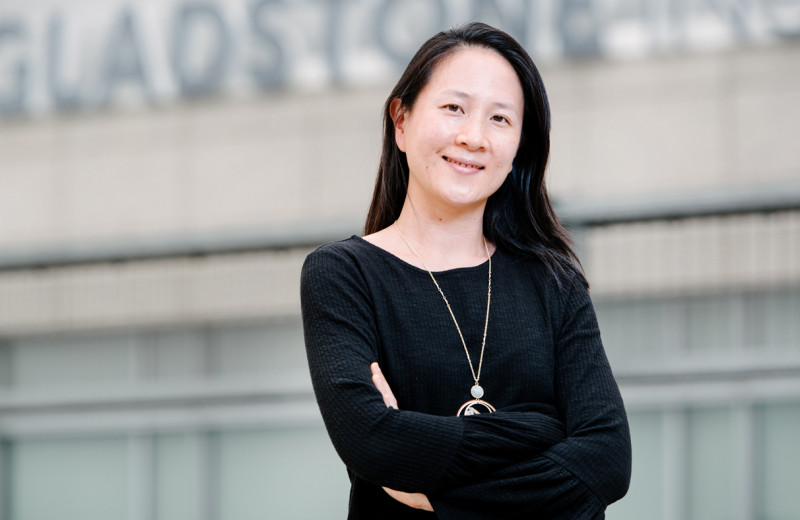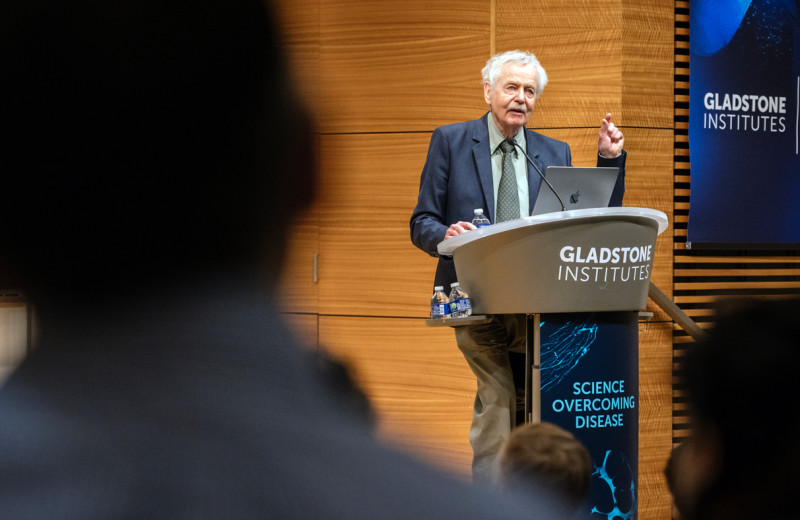Gladstone NOW: The Campaign Join Us on the Journey✕
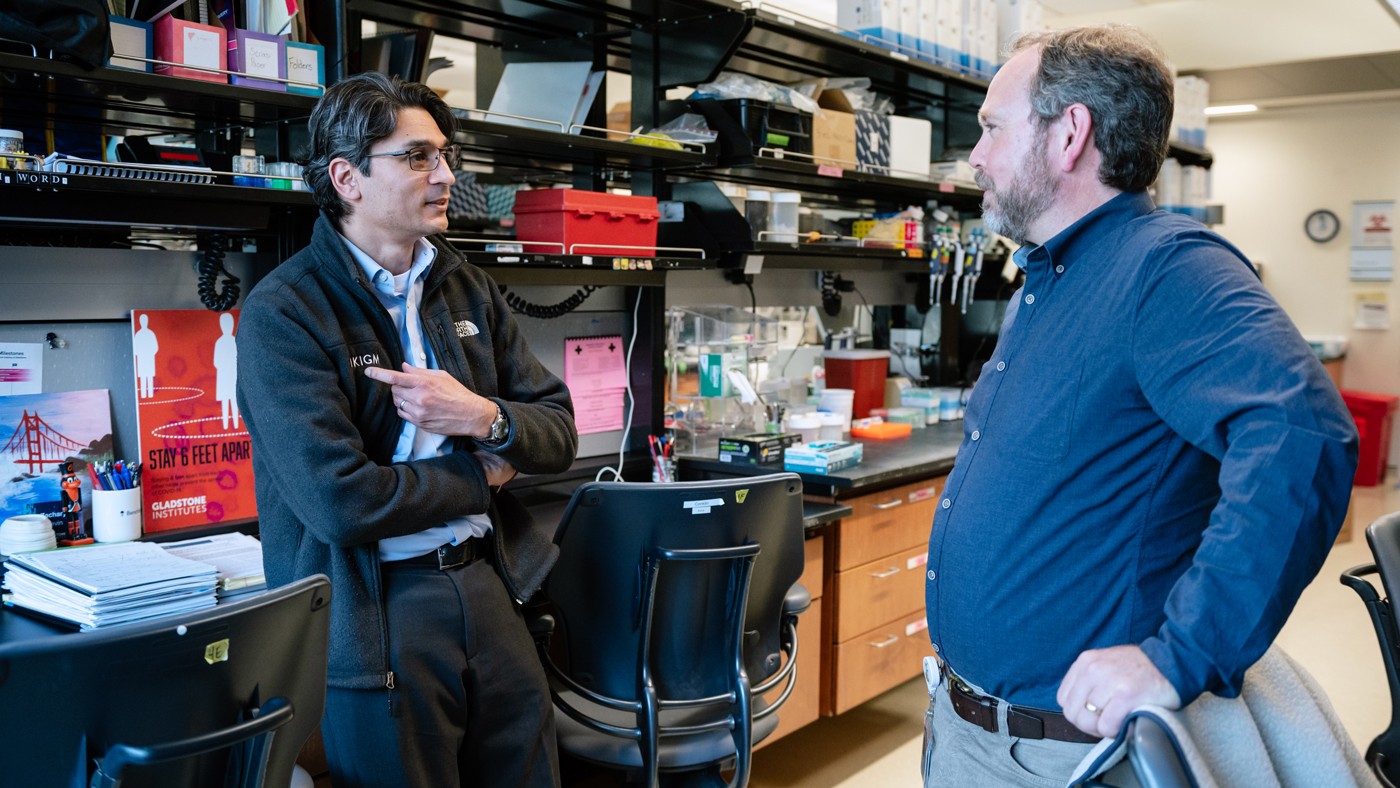
Winners of Gladstone’s Outstanding Mentorship Award, Irfan Kathiriya (left) and Luke Judge (right), share insights on guiding the next generation of scientists.
Mentoring the next generation of scientists is a key element of Gladstone’s mission. To reward those who exemplify this part of the mission, Gladstone annually solicits nominations for the Outstanding Mentoring Award. In 2022, Visiting Scientists Luke Judge, MD, PhD, associate professor of pediatrics at UC San Francisco (UCSF), and Irfan Kathiriya, MD, PhD, associate professor of anesthesia and preoperative care at UCSF, both received the award, which was presented to them earlier in 2023.
Kathiriya was nominated unanimously by members in the Bruneau lab, along with two mentees who have since moved on from Gladstone. His nominators highlighted Kathiriya’s interest in understanding his mentee’s aspirations, both short and long term, in order to help them achieve their goals. They also love that Kathiriya will host mock interviews, insisting that candidates wear their interview clothes—down to their shoes—to ensure they feel the most prepared for the actual interview.
“Although Irfan often works remotely, he is known for saying ‘My door is always open!’ and he means it,” says Kavitha Rao, PhD, a research scientist in Benoit Bruneau’s lab. “Irfan is always available over Slack, email, phone, or in person whenever anyone needs help. He also frequently solicits feedback on his mentorship and relationships with his colleagues, setting an example of conscientious character for folks around him.”
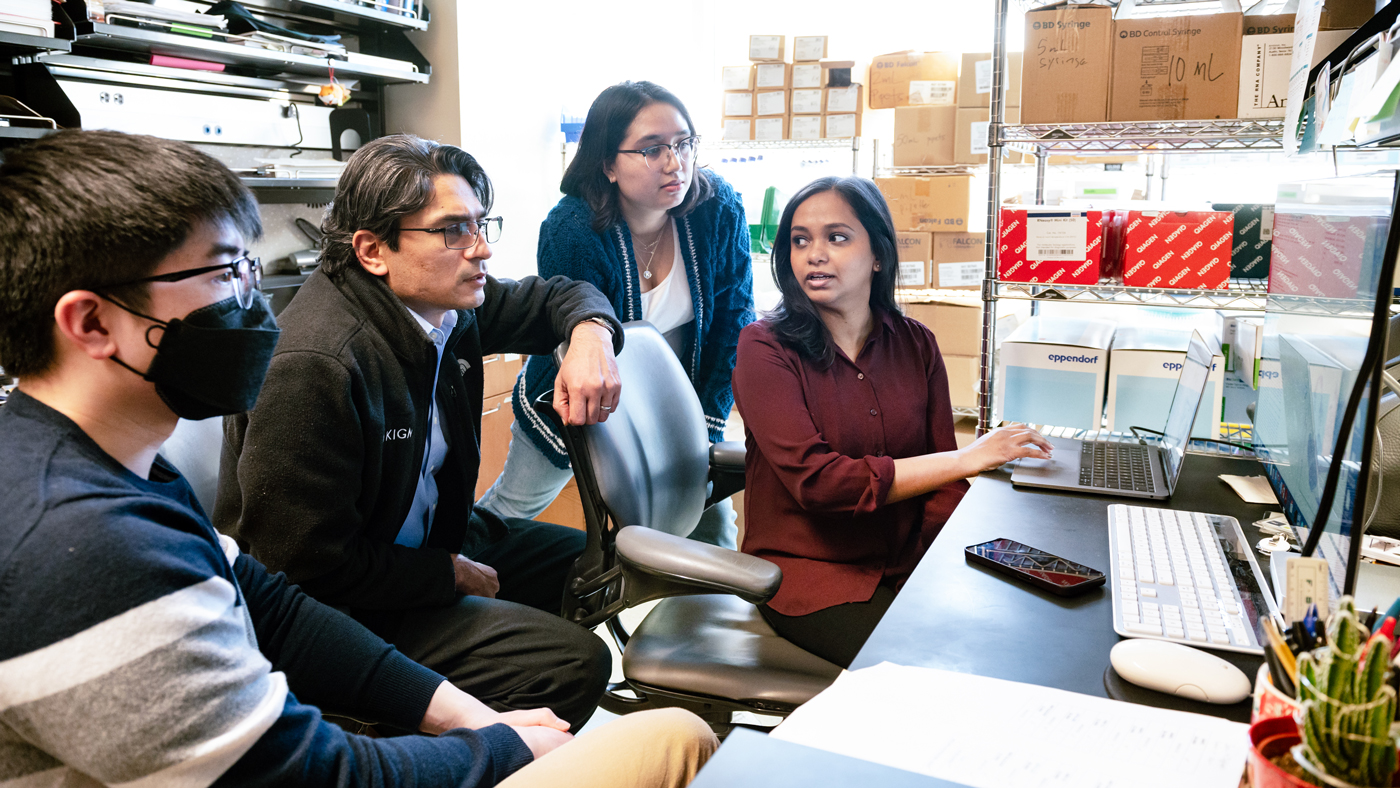
Irfan Kathiriya was nominated by members of Benoit Bruneau's lab. Kathiriya is seen here with his nominators (left to right) Kevin Hu, Kelly Hayes, and Kavitha Rao.
Judge was also nominated by his colleagues in the Conklin lab, who emphasized his patience and ability to tailor concepts to different learning styles. Judge leads the neonatology fellowship program at UCSF, where he brings in mentees for truly memorable and impactful visits, offering them an opportunity to shadow his work and allowing them to contextualize the research that happens in the lab.
“Luke has a genuine interest and excitement for our projects,” says Chiara Marley, visiting researcher and one of Judge’s nominators. “Not only does this help us feel good about our own work, but it also shows how motivating it can be to be passionate about your work.”
We sat down with both Judge and Kathiriya to discuss what winning this award means to them, what qualities make a good mentor, and how someone who is interested in becoming a mentor can get started.
How Does It Make You Feel to Get an Award for Mentorship?
Luke Judge: It was a great surprise and a huge honor to win the mentoring award at Gladstone, because one of the most enjoyable parts of working here all these years has been teaching and mentoring young scientists and other trainees. I’ve gotten to see them go on to have really successful careers in the next part of their pathway.
Irfan Kathiriya: It’s so humbling. It’s such a great honor just to be nominated by everybody in the lab—I think that in itself is an amazing award.
Why Is Mentorship So Important in Science?
Luke Judge: I think, in science, mentorship is particularly important because the training pathway to become a scientist is often really long. You can also have so many different types of careers in science—you can work in academia, at a private company, or in science communication, as a few examples. So, it’s great to have mentors who can help you understand all the different opportunities and navigate the types of training you need to be successful in any of those careers.
Irfan Kathiriya: In addition to the pursuit of science, there’s also a personal journey going on that is unique to each person. Everyone is just trying to figure out where they fit into the whole scientific ecosystem. I think that, in many ways, mentorship helps people figure out what sort of path they want to take.
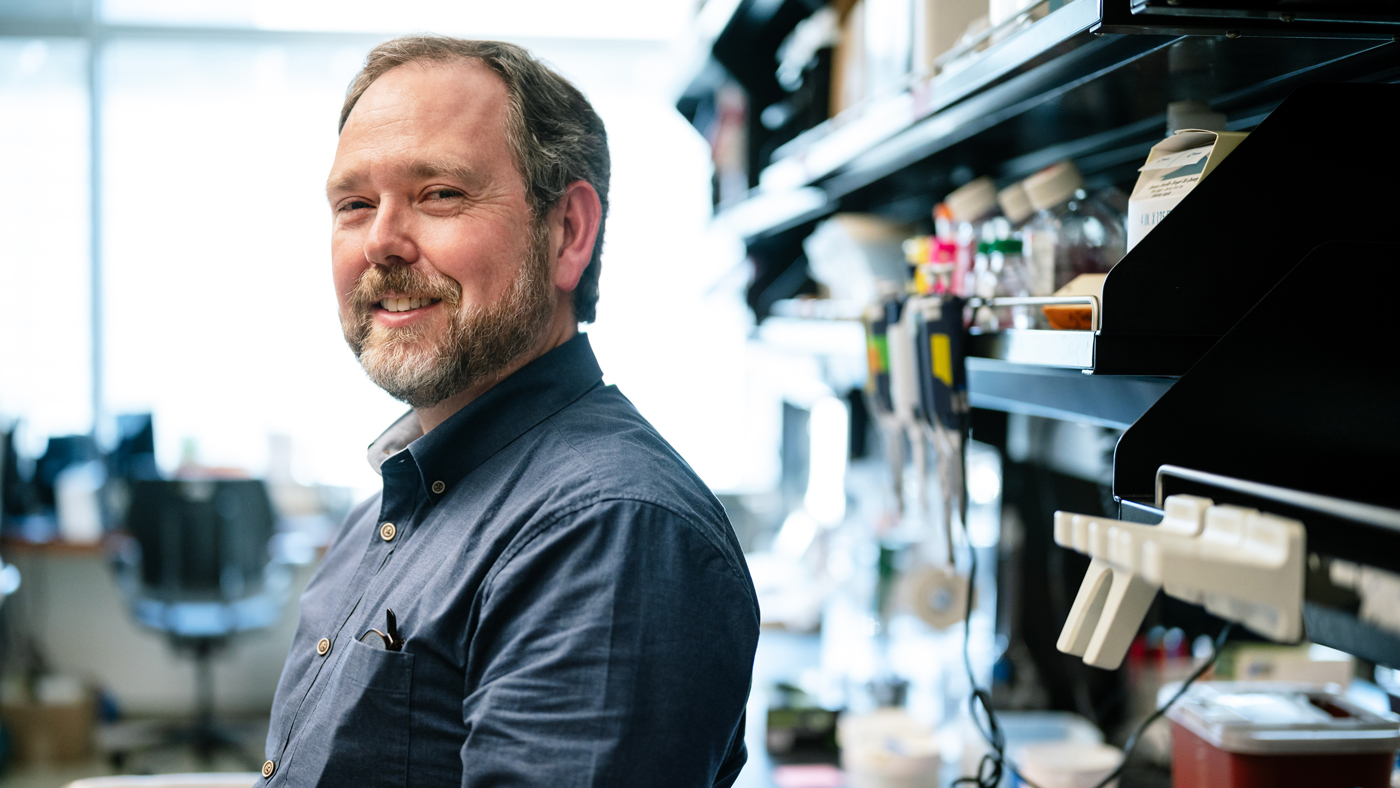
Luke Judge, MD, PhD, is also an associate professor of pediatrics at UC San Francisco.
What Qualities Make A Good Mentor?
Irfan Kathiriya: I think that it’s listening and finding opportunities where I might be able to say, “hey, have you thought about this?”.
One way of thinking about mentoring is a mentee going to someone’s office and saying, “I want to meet with you about this question.” But being a mentor is a two-way street. I think that it’s important to have these spontaneous interactions where the mentor also comes to the mentee, rather than the other way around.
The other important part is thinking about what is important to each mentee and what are their strengths, and then figuring out how, as the mentor, you can expand on that interest or gift.
Luke Judge: I think the most important thing for a mentor is to be altruistic, and really go into the mentoring relationship with a goal of helping the mentee and not to expect that they’re going to be the primary beneficiary of that relationship.
What Have You Learned from Past Mentors and How Do You Incorporate This into Your Mentorship Style?
Irfan Kathiriya: I’ve benefited from so many mentors. I’m standing on their shoulders. Many of them are here at Gladstone—Deepak Srivastava, Benoit Bruneau. I think a rewarding part of being a mentor is being invested in other people’s successes and seeing how they develop over time.
Luke Judge: I’ve had several different mentors. What I appreciated the most and the thing that I try to incorporate is being available and accessible to the people that I’m mentoring. On the flip side, I also need to understand when I maybe don’t have enough time, and be very clear about when I can be available, how much time I can be available, and to make sure that I don’t set up unrealistic expectations.
What Have You Learned from Your Mentees over the Years?
Luke Judge: All the people I’ve worked with have made suggestions to improve an experiment or the way I communicate. Everybody learns differently and I often find that others can correct some of my assumptions about the best way to explain things to people in a way that’s understandable.
Irfan Kathiriya: I think what I’ve learned is that even the smallest sort of input can really make a big difference for somebody. And so that motivates me to continue, knowing that even little things can help.
What Are the Responsibilities of a Mentor?
Luke Judge: I think the responsibility of the mentor in the relationship is to be available and to communicate clearly their expectations for the relationship—how do they want to communicate, what should the mentee expect from them. It’s also important to recognize when those expectations and the structure of the mentorship should change over time.
Irfan Kathiriya: I’m always looking for an opportunity to see how I can help. Sometimes that’s passive, like when someone approaches me with a question. But sometimes it’s more active. If I know someone is applying to medical school, I’ll ask them if they want to do a mock interview. I have experience going through the system and evaluating candidates, so that’s something I’d offer a mentee.
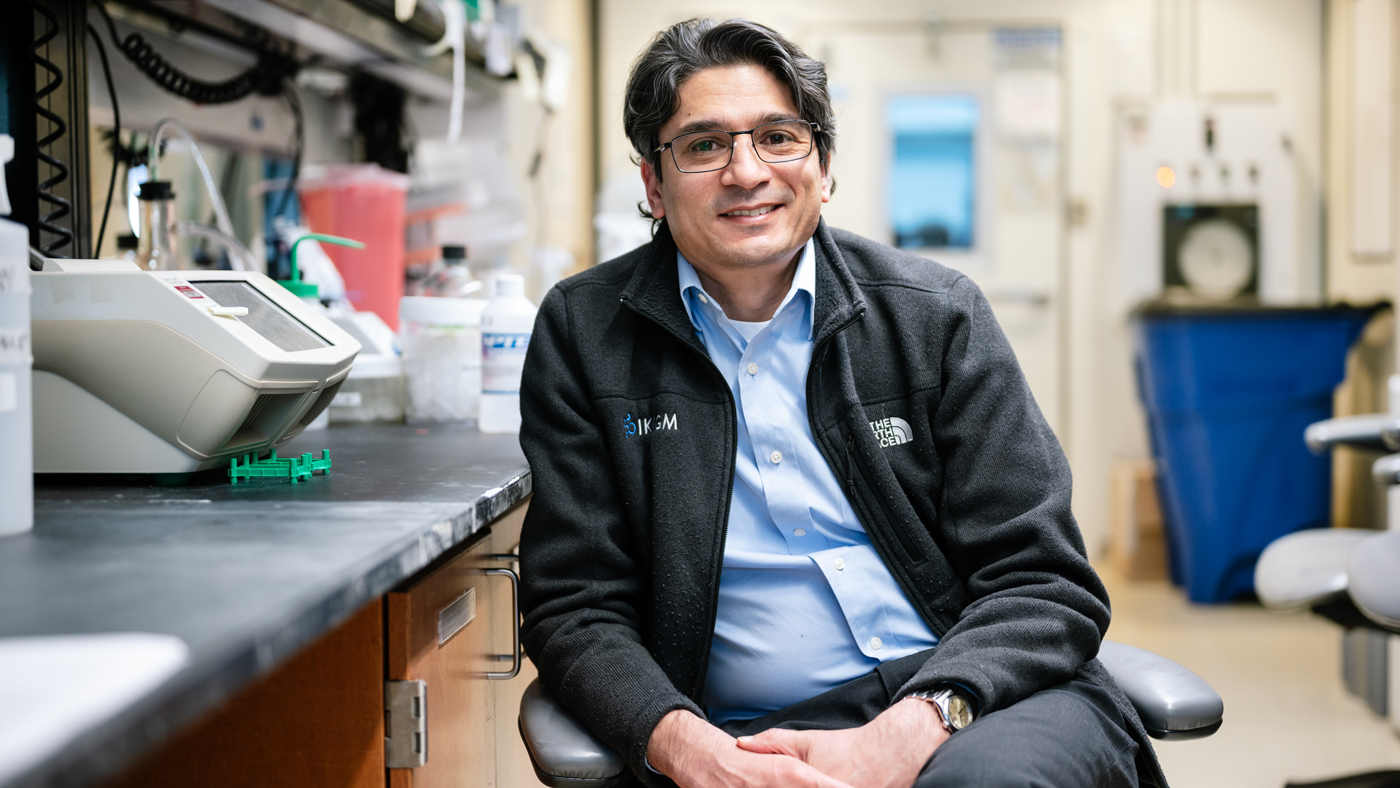
Irfan Kathiriya, MD, PhD, is also an associate professor of anesthesia and preoperative care at UC San Francisco.
On the Other Side, What Are the Responsibilities of the Mentee?
Irfan Kathiriya: The mentee has to identify who makes the most sense to be their mentor. I have many mentors, but starting out, I had just a few and then I expanded. I solicit different things from different people based on what their expertise is.
Luke Judge: In the early stages, the first thing is to just talk to everybody that you interact with and that you work with to ask them how they learned, how they got to where they are, who are the mentors that they identify as being helpful to them, and how did they find those mentors.
It’s reasonable to ask someone to be a mentor for something that might be very specific or only need a very short time, like developing a technique or a specific smaller project. And then, you can grow into those more longitudinal mentors over time.
Why Is Having Different Types of Mentorships in the Lab Important?
Luke Judge: It’s really crucial to have different types of mentors who are at different stages of their careers. Sometimes, there are questions or issues that you may feel uncomfortable asking your most senior mentor about. So it’s important to also have mentors who are more or less peers or near peers, who will be more informal and where you can be very open and honest to ask them questions that you might feel uncomfortable asking someone in a position of authority.
Having multiple mentors is almost required in many situations because one person can’t be everything to everybody.
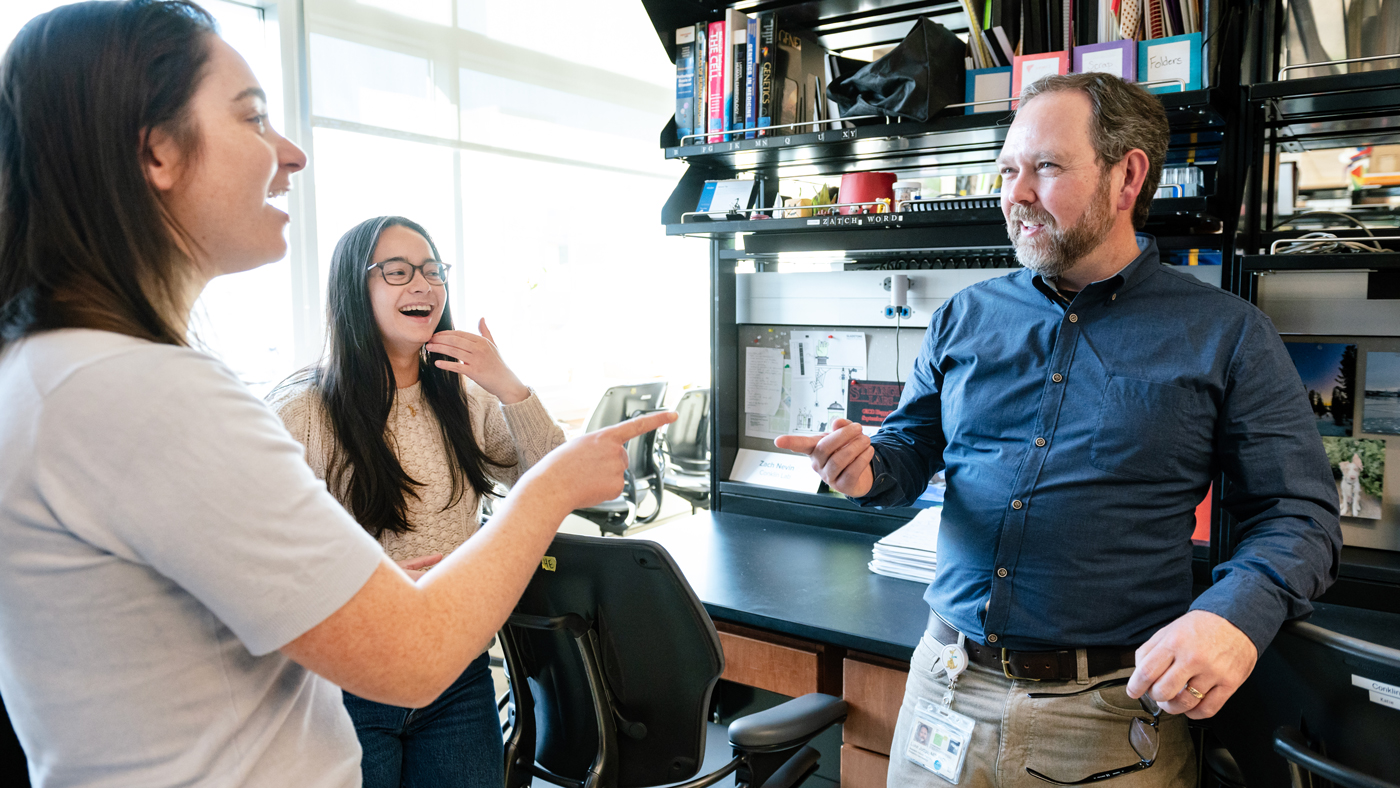
Luke Judge was nominated for the Outstanding Mentoring Award by members of Bruce Conklin's lab. Seen here with Judge (right) are two of his nominators Hannah Watry (left) and Chiara Marley (center).
If Someone Is Interested in Becoming a Mentor, Where Can They Start?
Irfan Kathiriya: There are many different kinds of mentor relationships. You can have peer-to-peer relationships where you can mentor someone else. It doesn’t have to be formal. And I think you can start there.
Luke Judge: Anybody can be a mentor, no matter how early they are in their career. In a lab, new people are always joining at different levels, and people are learning new techniques and skills, even if they’ve been in the lab for a while. And so people who are relatively new can start practicing their mentorship by teaching new people who join the lab or by teaching existing people in the lab methods and techniques that they may have not used before.
What’s The Best Piece Of Advice A Mentor Has Given You?
Irfan Kathiriya: One of the things that I remember is that it all works out in the end. Even if the path is circuitous, don’t worry—it’ll work out in the end. This has really helped me get through the ups and downs of my work and career path.
Want to Join the Team?
Our people are our most important asset. We offer a wide array of career opportunities both in our administrative offices and in our labs.
Explore CareersGladstone Scientist Nadia Roan Elected to American Academy of Microbiology
Gladstone Scientist Nadia Roan Elected to American Academy of Microbiology
Roan has made great strides in understanding how persistent viruses including HIV cause disease and how immunity to viruses shapes human health.
Awards News Release COVID-19 HIV/AIDS Infectious Disease Roan LabA Sculptor of Modern Regenerative Medicine
A Sculptor of Modern Regenerative Medicine
Among his myriad accomplishments, Rudolf Jaenisch—winner of the 2025 Ogawa-Yamanaka Stem Cell Prize—was the first to demonstrate the potential of induced pluripotent stem cells to treat disease.
Awards Ogawa Stem Cell Prize Profile Regenerative Medicine Stem Cells/iPSCsSix Gladstone Scientists Named Among World’s Most Highly Cited Researchers
Six Gladstone Scientists Named Among World’s Most Highly Cited Researchers
The featured scientists include global leaders in gene editing, data science, and immunology.
Awards News Release Corces Lab Doudna Lab Marson Lab Pollard Lab Ye Lab

